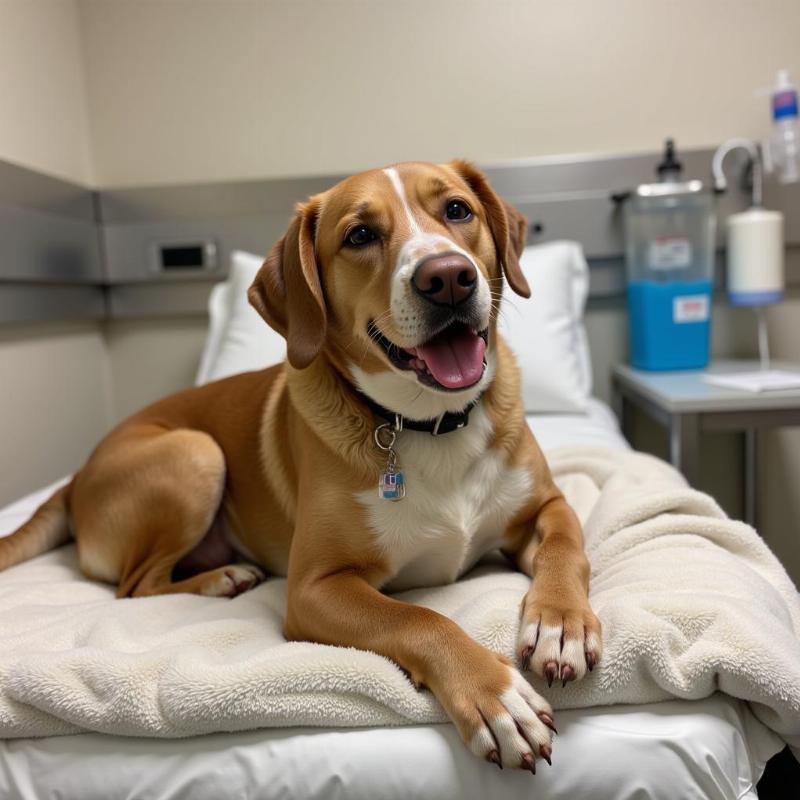Losing a beloved dog after intestinal surgery is a devastating experience. While intestinal surgery can be life-saving for dogs suffering from various conditions, it’s crucial to understand that complications can occur, sometimes with tragic outcomes. This article will explore the reasons why a dog might die after intestinal surgery, how to cope with the loss, and what questions you should ask your veterinarian to be fully informed about the procedure and its risks.
 A dog resting after surgery
A dog resting after surgery
Potential Complications of Intestinal Surgery in Dogs
Several factors can contribute to post-operative complications and, in rare cases, death. These include:
- Infection: The intestines contain a large amount of bacteria, and infection is a significant risk after intestinal surgery. Antibiotics are typically administered to help prevent this, but infections can still occur.
- Sepsis: A severe complication of infection, sepsis occurs when the body’s response to infection damages its own tissues and organs. This can lead to organ failure and death.
- Leakage at the surgical site: If the sutures or staples used to close the incision in the intestine leak, intestinal contents can spill into the abdomen, causing peritonitis (inflammation of the abdominal lining).
- Blood clots: Surgery can increase the risk of blood clot formation, which can block blood flow to vital organs.
- Adverse reactions to anesthesia: While rare, some dogs can have severe reactions to anesthesia, which can be fatal.
- Pre-existing health conditions: Dogs with underlying health problems, such as kidney or liver disease, are at higher risk of complications.
Coping with the Loss of Your Dog
The death of a dog is a profound loss. Allow yourself time to grieve and process your emotions. Talking to friends, family, or a pet loss support group can be helpful. Remember the happy times you shared with your dog, and celebrate the joy they brought into your life.
Questions to Ask Your Veterinarian
Before agreeing to intestinal surgery for your dog, it’s essential to have an open and honest conversation with your veterinarian. Ask about:
- The specific reason for the surgery
- The risks and benefits of the procedure
- Potential complications
- The expected recovery time
- The cost of the surgery and post-operative care
What to Do if You Suspect Negligence
If you believe your dog’s death was due to veterinary negligence, you may want to seek legal advice. Keep all medical records and documentation related to your dog’s surgery and care.
Why Did My Dog Die After Intestinal Surgery? Common Concerns Addressed
While every case is unique, understanding some common concerns associated with post-surgical mortality can help pet owners navigate this difficult time. Here are some questions often asked:
Could it have been prevented?
This is a natural question to ask, but the answer is complex. While preventative measures like thorough pre-operative assessments and meticulous surgical technique are always employed, complications can still arise.
Was it the anesthesia?
Anesthesia carries inherent risks, but modern veterinary practices minimize these through careful monitoring and individualized anesthetic protocols. While anesthetic complications are a possibility, they are not the most common cause of post-surgical death.
Conclusion
Facing the death of your dog after intestinal surgery is heartbreaking. While there are inherent risks associated with any surgical procedure, understanding these risks and asking your veterinarian the right questions can help you make informed decisions about your dog’s care. Remember to allow yourself time to grieve and seek support if needed. Cherishing the memories of your beloved companion can help you through this difficult time.
FAQ
- What are the most common complications after intestinal surgery in dogs? Infection, sepsis, leakage at the surgical site, and blood clots are among the most common complications.
- How can I help my dog recover from intestinal surgery? Follow your veterinarian’s post-operative care instructions carefully, provide a quiet and comfortable recovery area, and monitor your dog closely for any signs of complications.
- What are the signs of infection after intestinal surgery? Lethargy, loss of appetite, vomiting, diarrhea, fever, and redness or swelling around the incision site can be signs of infection.
- How long does it take for a dog to recover from intestinal surgery? Recovery time varies depending on the specific procedure and the individual dog, but it typically takes several weeks.
- What should I do if I think my dog is experiencing complications after surgery? Contact your veterinarian immediately if you notice any signs of complications.
- How can I cope with the loss of my dog? Allow yourself time to grieve, seek support from friends, family, or a pet loss support group, and remember the happy times you shared with your dog.
- What can I do if I suspect veterinary malpractice? Gather all medical records and consult with a lawyer specializing in veterinary malpractice cases.
About Beautdogs.us
Beautdogs.us is your premier destination for all things dog-related in the USA. We offer expert advice on dog breeds, care, and lifestyle, providing both new and experienced dog owners with trustworthy information. We are passionate about helping you build a strong and loving bond with your furry friend, ensuring they live a happy, healthy, and fulfilling life. From breed-specific guidance to product recommendations, we’re here to support you every step of the way. For any inquiries, please contact us at [email protected] or call us at +1 501-555-7529.